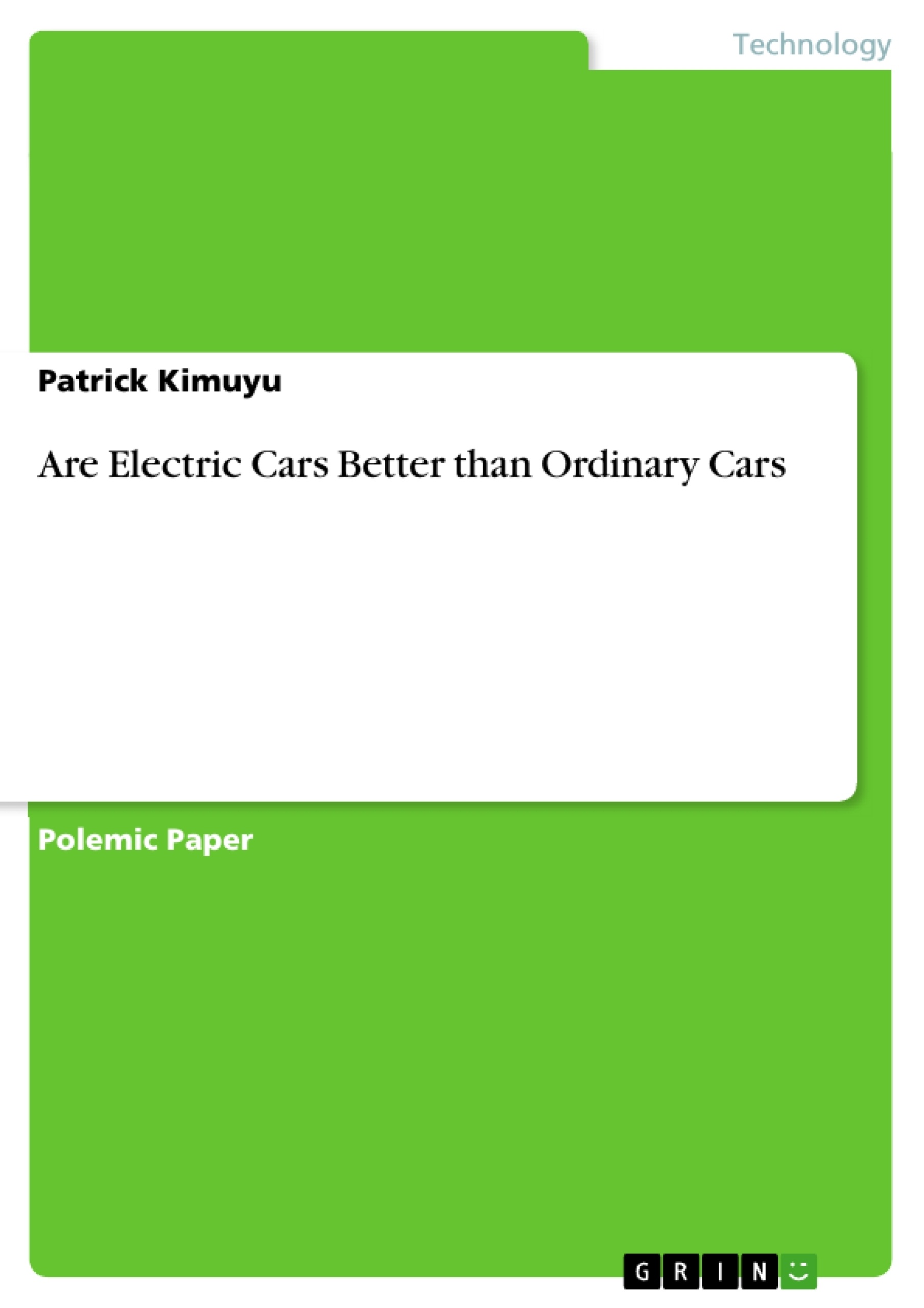Electric cars have emerged at a time when a constellation of issues is gathering among the global population. From a personal perspective, it is apparent that electric cars are not as beneficial to human race as it is claimed by some people. First, they pose health risk to the users due to electromagnetic radiations. Second, they cause harm to the environment. Finally, these cars are not convenient to the consumers. It is apparent that electric cars are not as beneficial as it is preached by most crusaders.
Evidence indicates that these cars are not safe, long-lasting and convenient for consumers. However, proponents argue that electric cars are safe. Second, electric cars are not environmental-friendly, especially due to their production process and disposal. In contrast, proponents claim that the cut in CO2 emission outweigh their environmental harm. Finally, electric cars are not convenient to the consumers due to affordability, mileage and recharging period. However, it is argued that these cars are quick with not fueling point visits.
Conclusively, it is apparent that the debate on electric cars is not varnishing from public talk any time in a foreseeable future. Therefore, this essay seeks to justify that electric cars are not any better than the ordinary cars.
Table of Contents
- Are Electric Cars Better Than the Ordinary Cars?
- Over the Centuries, Advances in the Automobile Industry Have Led to Fast and Convenient Movement of People
- In Retrospect, It Is Apparent That Electric Cars Are Not as Beneficial as It Is Preached by Most Crusaders
- The Second Reason Why Electric Cars Are Not Better Than the Ordinary Cars Is That They Are Harmful to the Environment
Objectives and Key Themes
This essay argues that electric cars are not superior to traditional gasoline-powered cars, despite their growing popularity. The author presents a critical analysis of the perceived benefits of electric vehicles, ultimately concluding that their drawbacks outweigh their advantages.
- Electric cars pose significant health risks due to electromagnetic radiation emitted by their batteries.
- The production and disposal of electric car batteries have detrimental environmental consequences.
- Electric vehicles are not as convenient for consumers in terms of affordability, range, and charging time.
- The author challenges the notion that electric cars are safer than traditional cars, arguing that their potential for harm is not fully understood.
- The essay explores the environmental impact of electric cars and challenges the assumption that they are a solution to climate change.
Chapter Summaries
- The first chapter introduces the topic of electric cars and their growing popularity, highlighting the potential benefits and drawbacks of this technology. It also presents the author's thesis statement: electric cars are not better than traditional gasoline-powered cars.
- The second chapter delves into the health risks associated with electric cars, focusing on the electromagnetic radiation emitted by their batteries. The author argues that these radiations pose a significant threat to drivers and passengers, potentially leading to health problems.
- The third chapter examines the environmental impact of electric cars, arguing that their production and disposal processes are detrimental to the environment. The author challenges the assumption that electric cars are a solution to climate change, suggesting that their environmental footprint is not as benign as often claimed.
Keywords
This essay focuses on the debate surrounding the benefits and drawbacks of electric cars. It explores key topics such as health risks, environmental impact, consumer convenience, and safety. The author critically examines the claims made by proponents of electric vehicles, challenging the notion that they are superior to traditional cars.
Frequently Asked Questions: Electric vs. Ordinary Cars
Are electric cars truly better for the environment?
The essay argues they are not necessarily better, highlighting detrimental environmental consequences from battery production and disposal.
What health risks are associated with electric cars?
The author points to potential health risks from electromagnetic radiation emitted by large vehicle batteries.
Are electric cars convenient for the average consumer?
According to the essay, issues with affordability, limited mileage (range), and long recharging periods make them less convenient than ordinary cars.
Do electric cars reduce CO2 emissions effectively?
While they cut tailpipe emissions, the author challenges whether these reductions outweigh the environmental harm caused during the manufacturing process.
Are electric cars safer than traditional cars?
The author challenges the safety claims of crusaders, suggesting that long-term risks and battery-related issues are not fully understood.
- Quote paper
- Patrick Kimuyu (Author), 2018, Are Electric Cars Better than Ordinary Cars, Munich, GRIN Verlag, https://www.hausarbeiten.de/document/412967


